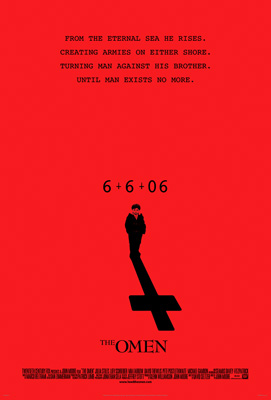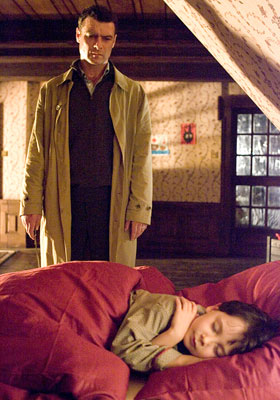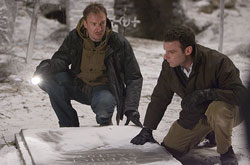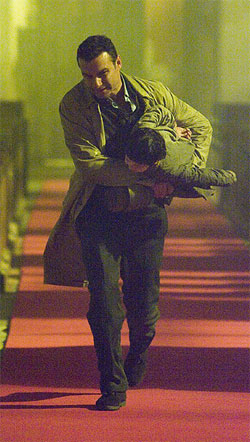 I have to admit that I first became aware of Liev Schreiber in Scream. I probably should have been on the ball sooner – he’s turned into one of the great American actors, on screen and on stage. He’s also recently tried his hand at directing with Everything is Illuminated, the #12 film on my 2005 Top 15.
I have to admit that I first became aware of Liev Schreiber in Scream. I probably should have been on the ball sooner – he’s turned into one of the great American actors, on screen and on stage. He’s also recently tried his hand at directing with Everything is Illuminated, the #12 film on my 2005 Top 15.
With The Omen Schreiber steps into the shoes of Gregory Peck, who created the role of the unwitting father to the Antichrist in Richard Donner’s 1976 original. It’s not Schreiber’s first time remaking a “classic” – he played the Laurence Harvey role in The Manchurian Candidate redo.
Liev isn’t our first bit of Omen coverage – click here to read my interview with the director, John Moore, and click here to read my talk with Biblical scholar Dr. L. Michael White (I think it’s pretty damned fascinating). Be warned – if you have never seen The Omen, there’s a question in here that’s a spoiler. But if you’ve never seen The Omen I probably don’t care that much about you. Sorry!
The Omen opens this Tuesday, because it’s the 6th day of the 6th month of the 6th year of the new millenium. Spooktastic.
Q: Is there some trepidation in taking on another remake?
Schreiber: Well, I do think that having been through this before on Manchurian Candidate and to some degree RKO 281, I guess that I had kind of made my peace with it for two reasons. One is that I’m a professional actor and it’s my job, and the other is that I think good stories have a way of retelling themselves. If I look at the model of Shakespeare’s plays, having missed the original production of Hamlet I’m very glad that they did it a couple of times afterwards. I kind of feel that way in particular about The Omen and I did feel that way about Manchurian Candidate as well. I felt like they were stories that when in the retelling had a poignancy and a prescience that was specific to the time that they were told.
Q: Do you find that a lot of the scripts that come in these days are remakes?
Schreiber: No. I don’t think so. It’s possible, but what isn’t a remake. How many stories are there really out there? I think that any film scholar could find grounds for just about any film that’s made right now being a remake of something else. I mean, all of Shakespeare’s ideas were basically taken from Plutarch and all of the Greeks and all of that. So there are very few original stories and sadly enough there are very few stories that have the kind of epic emotional conflict which is the kind of thing that actors look to play, look for in roles. Q: But isn’t there a difference between being in a new production of Hamlet and being in a remake of a movie that’s already preserved on film to be revisited?
Q: But isn’t there a difference between being in a new production of Hamlet and being in a remake of a movie that’s already preserved on film to be revisited?
Schreiber: I’m not entirely sure about that. I mean, once we get into preserving stage performances on DV tape it would be interesting to have that conversation ten years from now. I think that part of it is that film is such a young medium and that there is the illusion… I think that audiences feel a sense of ownership of films, which they are entitled to, and I think there’s also the idea that films are constantly reinventing themselves when in fact they are not. They are drawing from things that have been around culturally for a hundred years.
Q: Your Manchurian Candidate was very different from the original, but this version of The Omen is very faithful.
Schreiber: Yes, in structure. It is, certainly. Well, yeah, I’m rehearsing Macbeth right now and we’re not tweaking the script very much [Laughs].
Q: You’re not superstitious?
Schreiber: No. Unfortunately I’m not. Otherwise I would have some very good Curse of The Omen stories for you, but I have none.
Q: Patrick Stewart insists on calling Macbeth ‘The Scottish Play.’
Schreiber: English guys are poncey [Laughs].
Q: Do you think the Devil is still scary in 2006?
Schreiber: I do. I do. I’m not entirely sure if it is merely the Christian embodiment of the devil that scares people, but I think that the idea of the manifestation of evil is something that still really, really gets people. I think that there is a reason why in 1976 this film rattled so many people. I think that there is potential that in 2006 the conditions are similar and that it will rattle people again.
Q: What’s your take on evil in general? You directed Everything is Illuminated, which deals with the Holocaust, which was probably the most specific example of evil in the 20th Century. Do you feel that the idea of a mythical manifestation or embodiment of evil like the Devil reduces human culpability in such horrors?
Schreiber: If you look at the biblical model, the biblical model has that the first interaction that we had with the devil was the serpent and the Tree of Life, and what did the serpent give them? He gave them knowledge, and knowledge is the ultimate evil, and I kind of like that theory. There is a line in Macbeth that I like in his speech. ‘To be thus is nothing, but to be safely thus,’ where he is essentially saying to be king is nothing, but to stay king now is the problem, and so how many more people do I have to kill to remain happy. And later on in that speech he says, ‘And mine eternal jewel given to the common enemy of man.’ Basically that’s my soul given to the common enemy of man being the devil, but I think that in this case, in the case of that play it means ambition. So when you go back to the biblical model of the Garden of Eden that what the devil gave us was an awareness of ourselves, an awareness of our station in life. What evil is, is the embodiment of that awareness as being not sufficient somehow. We had to be more. We had to be better. We had to be somehow beyond what we were and that is, in my mind, I think a pretty good model for the root of all evil.
Q: ‘Present fears are less than horrible imaginings.’
Schreiber: It’s a great line. It’s a terrific line. And that I think applies very much to The Omen, the idea that nothing can happen in your life that is as scary as what you can imagine. The threat of the end of the world trumps everything. The threat of what’s to come trumps everything including rational behavior.
Omen, the idea that nothing can happen in your life that is as scary as what you can imagine. The threat of the end of the world trumps everything. The threat of what’s to come trumps everything including rational behavior.
Q: You’ve done quite a few horror films over the years. Why is that? Is it that you like horror films?
Schreiber: Honestly, I think that it has something to do with my eyebrows.
Q: Was there any ambivalence about playing a role played so well by Gregory Peck?
Schreiber: Having been through that before, with Orson Welles and Laurence Harvey, I was kind of primed for it. I don’t think that in a million years I could come anywhere near to reproducing Gregory Peck’s performance in The Omen and for that matter the same goes for Laurence Harvey and certainly Orson Welles, but I also don’t think that it’s possible. I think that if you’re doing your work honestly as an actor, you’re responding to things intuitively, then you will own the role. That’s just the way it is.
Q: Considering how close this film hews to the original, how much freedom did you have to make the role your own?
Schreiber: It’s not a question of freedom. If you’re responding intuitively to the text and the other actors, there is no one else but you there. Whether you are compared to him at the end of the day is going to happen of course, but that is beyond your control if you’re doing your job well.
Q: If there was another film version of Glengarry Glen Ross, would you be in that?
Schreiber: Absolutely. It’s a great character. I love that character.
Q: What did directing Everything is Illuminated do to you as an actor?
Schreiber: I think that it probably made me really obnoxious in the first few weeks of Omen, but I kind of realized that I was doing it pretty early on and tried to stop.
Q: How were you being obnoxious?
Schreiber: It’s just hard to come out from under the bell jar of feeling responsible for everything and that’s a habit that doesn’t die easily because it’s a survival mechanism when you’re directing a film, but then when you’re acting you forget that part of what you need to do is that you need to kind of submit to the moment. You need to let go of your
intellectual anxieties about how you think things should go. It’s always been hard for me to do that because I think that I approach acting more from a directorial perspective than a purely emotional perspective.
Q: Will you be directing again?
Schreiber: I hope so. I hope so.
Q: The DVD of Everything is Illuminated is bare bones. Are there plans for a new edition? Schreiber: I wish that there were, but Warner Independent felt that that’s all they were prepared to release which was a little bit of a bummer. Thanks for asking, though.
Schreiber: I wish that there were, but Warner Independent felt that that’s all they were prepared to release which was a little bit of a bummer. Thanks for asking, though.
Q: Was it difficult to prepare with the young actor for the scene where you’re thrusting Damien on the church floor, about to stab him?
Schreiber: I didn’t actually do it with a child. It was a doll. I wasn’t comfortable doing that with a seven year old boy.
Q: I imagine there were a number of scenes where the kid was kept out of the loop.
Schreiber: Yeah. At least by me, and that’s for certain. I didn’t feel that it was appropriate or necessary to explain to him what was going on. It was just a question of finding the right game that would get him in the mood to do the scene that we wanted to do. That really involved allowing him to punch me in the belly fifteen times a day.
Q: Did you try to distance yourself from him?
Schreiber: It was actually the opposite. Julia [Stiles] was sort of doing that with him. I noticed that Julia was sort of being distant with him and that she felt that that was appropriate for her character. For me, I knew that we had to interact with each other in such a physical way that I wanted him to comfortable and I wanted him to be playful with me and if anything I wanted him to feel right at home sort of kicking and screaming and biting and jumping all over my head, that that would be fun.
Q: Can you talk about working with Julia Stiles and Mia Farrow?
Schreiber: That was amazing. I had no idea that John [Moore] was going to be able to get a cast together like that, and they just started to stream in one after another. I know people say things like this at junkets all the time, but in this case it’s absolutely true – there were several actors on that film who I have deeply admired from a distance for a long time, including David Thewlis and Pete Postlethwaite and Michael Gambon and Mia Farrow. I was just continually shocked at the actors who signed onboard. It was a real treat.
Q: Is there a chance for you to return to the Tom Clancy world? There are a couple of films in the planning stages, including one that would be an origin story for John Clark.
Schreiber: I would love it. No one has said a word to me. I loved playing John Clark. I would love to continue.
Q: You don’t seem to get a lot of action roles.
Schreiber: I know. It must be my eyebrows again.
Q: So what’s next?
Schreiber: Rehearsing Macbeth and that goes into previews June 13th and closes July 16th. I have a small part in The Painted Veil which is an adaptation of the Somerset Maugham tale that John Curran directing with Ed Norton and Naomi Watts and then hopefully a summer to stay at home and look for a film project.
Q: When you’re going back and forth between films and the stage is there ever a point where you think, ‘I want to do a play right now but maybe I should do a film so my quote is up, or that my name is out there’?
Schreiber: Yeah. That conversation happens a lot. I think that because I live in New York it sort of takes care of a lot of that for me. I also think that I’ve been fortunate enough that I have been able to develop good relationships with places like The Public Theater, and the last trip to Broadway went pretty well. So I think that other people see the value that I see in it and so they don’t discourage it anymore as much as they used to.